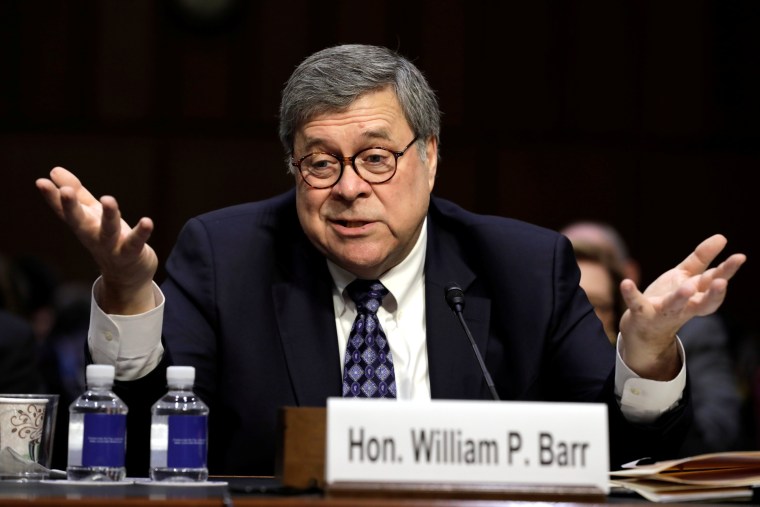About a year ago, Donald Trump seemed a little more agitated than usual, and it led the beleaguered president to create a new conspiracy theory. In fact, it was one of Trump's favorite kind of conspiracy theories: one in which he's the victim.
The Republican argued in May 2018 that during his presidential campaign, the Justice Department may have utilized "spies" inside his political operation. In the days and weeks that followed, the conspiracy theory went through a couple of iterations, but Trump was nevertheless delighted to tout what he called "Spygate."
It was, of course, a very odd tale, which even some congressional Republicans had no use for. Trump's most shameless and sycophantic supporters still occasionally throw around the allegation, but most know not to take it seriously.
It was against this backdrop that we heard Senate testimony from Trump's attorney general this morning.
Attorney General William Barr, defending his decision to order a review of the Trump-Russia probe's origins, told a Senate panel Wednesday that he thinks "spying did occur" by the government on President Donald Trump's 2016 presidential campaign."For the same reason we're worried about foreign influence in elections...I think spying on a political campaign -- it's a big deal, it's a big deal," Barr said in response to a question from the ranking member on the Senate Appropriations subcommittee, Jeanne Shaheen, D-N.H., who had asked why Barr is looking into the origins of the investigation.
When the New Hampshire Democrat asked, "You're not suggesting that spying occurred?" Barr paused before ultimately replying, "I think spying did occur."
As part of the same sworn testimony, he suggested there was "a failure among" among the "upper echelon" in federal law enforcement, which he feels obligated to examine.
This certainly brings the attorney general in line with the White House's talking points, but that doesn't make the underlying claim true.
In fact, it's not even clear what in the world Barr was talking about. In general, when Trump and his followers talk about "spying," they tend to point to surveillance of Carter Page, one of the president's more bizarre pre-election foreign policy advisers. This has never been an argument worth taking seriously: not only was surveillance of Page warranted and court-approved, but it began after he was a member of Trump's advisory team.
It's possible Barr may have been referring to efforts to glean information from George Papadopoulos, another campaign adviser, but that really doesn't make sense, either.
In fairness, it's worth emphasizing that the attorney general seemed to realize that he went a little too far in his Senate testimony. After declaring that there was spying on the Trump campaign, Barr later added, "I am not saying that improper surveillance occurred. I am saying that I am concerned about it and I'm looking into it."
Nevertheless, he must realize the political weight of a loaded term such as "spying," but Barr, already suspected of being overly concerned with the president's political interests, said it anyway, effectively extending the attorney general's support for one of the White House's most provocative conspiracy theories.
Under the circumstances, Bill Barr entered the day facing meaningful questions about his credibility and political independence. Those questions are considerably louder now.
Postscript: House Judiciary Committee Chairman Jerry Nadler (D-N.Y.) said this morning that the attorney general's comments "directly contradict" information the Justice Department has previously shared with Congress. Nadler has asked for an immediate briefing on Barr's latest comments.
House Intelligence Committee Chairman Adam Schiff (D-Calif.) added that the attorney general's rhetoric "strikes another destructive blow to our democratic institutions."
